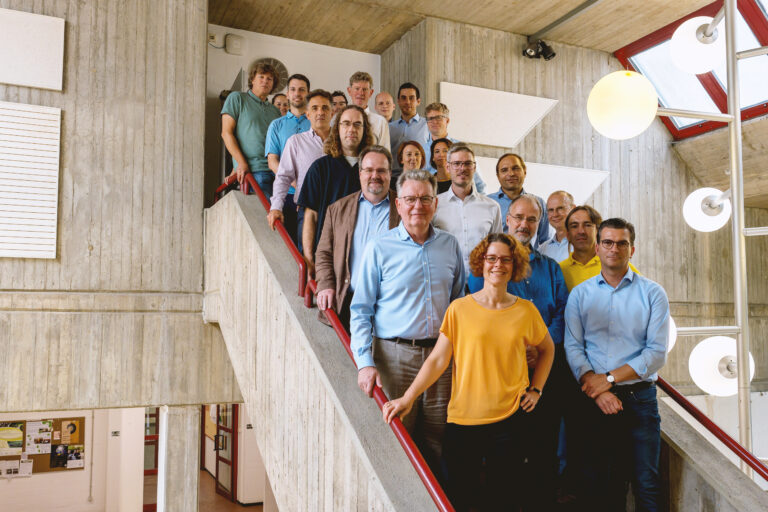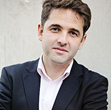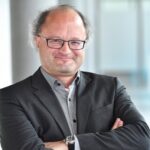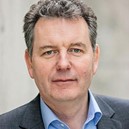Get to know the team


Prof. Dr. Jürgen Klankermayer
Spokesperson
heads the Chair of Translational Molecular Catalysis and is scientific director of the CAT-Catalytic Center, a joint initiative of Covestro AG and RWTH Aachen University. His team’s research focuses on the development of molecular catalyst systems at the interface of chemistry and energy, which result in customized processes at pilot plant scale in a translational process through interdisciplinary collaborations. In recent years, a tailor-made technology platform for the reduction of carbon dioxide, biomass and polymers has been developed. With the catalytic conversion of plastics, it has been possible to integrate molecular hydrogen and biomass into raw material recovery in an exemplary manner, thereby confirming the effectiveness of the concept of a multidimensional circular economy based on the open-loop concept.

Prof. Dr. Regina Palkovits
Spokesperson
is Head of the Chair of Heterogeneous Catalysis and Chemical Technology at RWTH, Director of the Institute for Sustainable Hydrogen Economy at FZJ and Max Planck Fellow at the Max Planck Institute for Chemical Energy Conversion. With heterogeneous catalysis and material design as core competencies, she and her team develop sustainable chemical processes. From 2019 to 2022, she headed the Sustainable Chemistry Division of the GDCh, and her group is one of the leading research teams worldwide in the development of catalytic processes for biomass utilization. In the former Clusters of Excellence Tailor-made Fuels from Biomass as well as the current Fuel Science Center, she developed high-performance chemo- and electrocatalysts for CO2 activation and plastics recycling as well as new adsorbents for energy-efficient biorefinery separation processes. Another research focus concerns innovative catalyst systems in the form of single-atom catalysts and metal-free catalysis. In industry-related projects such as Bio4MatPro, she scales up sustainable processes and products with partners.

Prof. Dr.-Ing. Lars M. Blank
Core-team
chemical engineer and biologist, heads the Chair of Applied Microbiology at RWTH. In research, his team focuses on fundamental and applied aspects of microbial metabolism. Research on in silico and in vivo metabolic networks enables a deeper understanding of cell functions and thus provides contributions to rational strain development. The developed microbes use sustainable carbon (from biomass, CO2, and waste (e.g., plastics)) as substrate for producing chemicals and materials. In catalaix, the metabolic funnel of microbial metabolism will be used to access novel plastic monomers and bioplastics.

Prof. Dr. Grit Walther
Core-team
heads the Chair of Operations Management at RWTH. Her team’s research focuses on application-oriented, techno-economic modeling and evaluation of value networks at the interface of technology, economics and sustainability. The research is conducted in interdisciplinary cooperation with engineering and natural science research institutes, industrial companies, and political decision-makers. Specifically, the conception of new value-added networks for bio-based plastics and platform chemicals, of recycling networks, as well as the implementation of sectoral technology and regulatory impact assessments using methods of techno-economic assessment, life cycle assessment, mathematical optimization and dynamic simulation. The results of the research lead to recommendations for action and standards for industry and policy makers.

Prof. Alexander Mitsos, PhD
Core-team
heads the Chair of Process Systems Engineering (AVT.SVT) within Aachen Process Engineering (AVT). The research group focuses on the development of methods and algorithms for the optimization of (electro-)chemical processes. These are model-based, combine suitable mechanistic and data-driven models, and are supported by laboratory experiments. Professor Mitsos leads the DFG Priority Program 2331 “Machine Learning in Chemical Engineering” and the Helmholtz Research Training Group “Helmholtz School for Data Science and Energy”. He is co-spokesperson in the DFG Collaborative Research Center SFB 985 “Functional Microgels and Microgel Systems”. Within this SFB, AVT.SVT has demonstrated in collaboration with research groups from chemistry that model-based microgels with desired properties can be produced in batch and continuous reactors.

Prof. Dr. Kathrin Greiff
catalaix-PI
heads the Institute for Anthropogenic Material Cycles at RWTH, is Rectorate Representative for Sustainability and a founding member of the Center for Circular Economy at RWTH. Her team studies solutions and methods to make anthropogenic material flows recyclable and thus to develop raw material management on the product and material level as well as to demonstrate and implement it using practical examples. Her team combines the modeling and evaluation of processing and recycling processes with a view to entire product systems and life cycles in the sense of circular economy and complements this expertise with technical implementation and demonstration.

Prof. Dr. Martin Grohe
catalaix-PI
heads the Chair of Logic and Theory of Discrete Systems at RWTH. He works on the methodological and theoretical foundations of computer science. The spectrum of topics ranges from fundamental mathematical problems to concrete applications in physics, electrical engineering or process engineering. A current focus of his group’s work is the development of machine learning methods for complex structured data such as networks and graphs. He has been a key contributor to the theory of Graph Neural Networks. These are a flexible “deep learning” architecture for graph-based data with diverse applications, especially also in chemistry and process engineering.

Prof. Dr. Sonja Herres-Pawlis
catalaix-PI
heads the Chair of Bioinorganic Chemistry at RWTH Aachen University, where her team works on current issues in bioinorganic chemistry and the synthesis and recycling of bioplastics. Here, the team combines methods of coordination chemistry with modern spectroscopic methods with density functional theory and machine learning methods to create and characterize fast oxidation catalysts, robust and fast catalysts for lactone polymerization and depolymerization of polyesters, but also nitrene systems and electron transfer systems. Especially in the field of bioplastics, scaling up is a key issue to bring basic research into application. Another focus of the work is chemical workflows and chemical research data management.

Prof. Dr.-Ing. Andreas Jupke
catalaix-PI
is head of the Chair of Fluid Process Engineering at RWTH and director at the Institute of Bio- and Geosciences (IBG-2, Plant Sciences) at FZJ. His research focuses on the development of energy-efficient separation processes using extraction, crystallization and chromatography, as well as on flexible multiphase reactors. In AVT’s research biorefinery, he works with partners to scale up new biotechnology processes to a technical scale. Other research areas include the development of technologies for the circular economy of polymers and metals. The goal of his research in catalaix is to develop robust and efficient separation processes for transforming chemical value chains into an open-loop circular economy.

Prof. Dr. Lars Lauterbach
catalaix-PI
is head of the research group “Synthetic Microbiology” at RWTH. His research focuses on gas-based bioprocesses using synthetic biology tools to design energy modules for biological systems. His research includes the development of tailored microorganisms and artificial enzyme cascades that use hydrogen and methane as sustainable energy sources to produce chemicals for a future bioeconomy. In recent years, he has developed a biocatalytic platform for hydrogen-driven production of e.g., chiral alcohols and amines. For more than 15 years, he has worked with hydrogen oxidizing bacteria that use hydrogen to produce reduced products such as biopolymers and single cell proteins.

Prof. Dr.-Ing. Jørgen Magnus
catalaix-PI
heads the Chair of Biochemical Engineering at RWTH. The core competence of the chair is the characterization of processes in bioreactors of all scales – from microtiter plates to fermenters. The focus is on the development and application of innovative methods for online process analysis and control. Further central topics are synthesis gas fermentation and the production of sustainable products from fermentations. Drawing from his industry experience, Prof. Magnus contributes the expertise to develop fermentative processes on an industrial scale. In this context, it is crucial that an overall concept is developed in which all basic operations of the process are integrated so that the overall process can be optimized in terms of economic efficiency and energy and CO2 savings.

Prof. Dr. Andrij Pich
catalaix-PI
heads the Chair of Functional and Interactive Polymers at RWTH and is scientific director of the DWI Leibniz Institute for Interactive Materials. His team’s research focuses on the development of new polymerization processes, novel (bio)macromolecular structures and adaptive polymer materials for biocatalysis, crop protection and medicine. In recent years, a tailored technology platform for the modification of polysaccharides from renewable resources and the synthesis of tailored nano- and microgels has been developed. Novel bio-based polymer materials are characterized by high chemical functionality, programmable degradation and high compatibility with biological systems and enable reduced environmental impact as well as efficient integration into sustainable circular economy.

Prof. Dr. Ulrich Schurr
catalaix-PI
heads the Institute of Plant Sciences at FZJ. The institute is a world leader in the development and application of quantitative methods for the analysis of plant architecture and function. For more than 10 years, he has been coordinating the Bioeconomy Science Center (BioSC), the largest European research network on systemic, sustainable bioeconomy based on the cooperation of the universities of Aachen, Bonn, Düsseldorf and FZJ. With the initiative BioökonomieREVIER, he coordinates the development of a cross-sectoral model region for sustainable bioeconomy in the context of the structural change in the Rhenish lignite mining area. He is a member of the International Advisory Council Global Bioeconomy and advises companies and scientific organizations worldwide on the development towards a sustainable bioeconomy.

Prof. Dr. Ulrich Schwaneberg
catalaix-PI
is head of the Chair of Biotechnology at RWTH Aachen University and member of the scientific board of the DWI Leibniz Institute for Interactive Materials. His team’s research focuses on the development of protein engineering methods to discover basic protein design principles and structure-function relationships. Furthermore, a functionalization platform with >120 material binding peptides has been built over the last 8 years, allowing to upgrade polymers, metals/alloys and natural surfaces in a cost-efficient and scalable way. Via the use of binding peptides, polymer degrading enzymes have been fused with material binding peptides that enable accelerated degradation of polymers. The material binding peptide approach is not limited to biological catalysts but can also be combined with chemical catalysts and opens sustainable solutions for a polymer cycle economy in closed and open loops in combined processes.

Prof. Dr.-Ing. Niklas von der Aßen
catalaix-PI
heads the Chair of Technical Thermodynamics. He is also the rectorate representative for sustainability. His team’s research ranges from sustainability assessment and optimization of international energy and industrial process systems to simulation and experimental validation of apparatus prototypes to experimental measurement and prediction of material data and reactions. In all research areas, sustainability and climate protection by means of life cycle assessments (LCA) are consistently integrated as target variables in the development of methods, tools and technical components.

Prof. Dr. Peter Wasserscheid
catalaix-PI
is founding director of the Institute for a Sustainable Hydrogen Economy of the FZJ, head of the Institute for Chemical Reaction Engineering at FAU Erlangen-Nürnberg and director of the Helmholtz Institute Erlangen-Nürnberg for Renewable Energies. The group’s research focuses on catalyst and process development for a more sustainable chemical industry and an emission-free energy system of the future. The group is a world leader in the development of catalytic processes for chemical hydrogen storage, in particular using Liquid Organic Hydrogen Carrier (LOHC) systems. Another focus is on innovative solvent systems. Scientific work includes catalyst and reactor development, system design and the realization of larger demonstrators. The group has extensive experience in the field of technology transfer.

Prof. Dr. Matthias Wessling
catalaix-PI
heads the Chair of Chemical Process Engineering at RWTH and is a member of the scientific advisory board at the DWI Leibniz Institute for Interactive Materials, where he also has a research group. His team’s research focuses on the development of integrated reactors for conversion and separation. In particular, he uses his many years of expertise in membrane technology and electrochemical process engineering. Fundamental studies at interfaces to mass transfer allow him to tailor development from the micro to the macro scale. In recent years, tailor-made reactors have been designed using additive manufacturing for the electrochemical depolymerization of biomass-based polymers such as lignin or cellobiose, among others, and their efficiency has been optimized using integrated membrane separation.
